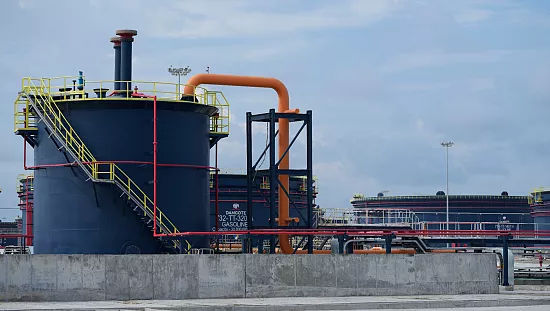Africa’s richest man, Aliko Dangote, is once again shifting the frontiers of industrial ambition — this time with a plan that could make Nigeria home to the largest oil refinery in the world.
Barely a year after commissioning his $20 billion Dangote Refinery, the billionaire industrialist revealed his intention to boost production capacity from 650,000 barrels per day (bpd) to an astonishing 1.4 million bpd. If successful, this expansion would surpass India’s famed Jamnagar Refinery, which currently leads global rankings at 1.36 million bpd.
A Vision Beyond Boundaries
Speaking in Lagos, Dangote explained that the expansion is not just about scale but strategy. “We already have the infrastructure here,” he said. “If we were to build elsewhere, we’d spend billions again on infrastructure. So the best move is to grow from within.”
Industry observers describe this announcement as a defining moment for Africa’s energy future — a statement that the continent can move from being a crude exporter to a value-added energy powerhouse.
No Monopoly, Just Momentum
Dangote’s rapid expansion has stirred speculation that he might acquire one or more of Nigeria’s aging state-owned refineries. However, the business mogul firmly dismissed those claims, noting that such a move would invite unnecessary controversy.
“Buying those refineries? Once we touch them, you will hear a lot of noise,” he said candidly. “There are others with money — perhaps even more than we have — who should try their own luck. That way, no one can accuse us of seeking a monopoly.”
Dangote’s response reflects a consistent philosophy: build, don’t buy. While critics have often accused him of dominating markets, he insists his empire thrives on innovation and persistence, not acquisition.
A Challenge to Fellow Industrialists
Calling on other investors and private players to participate, Dangote encouraged local energy groups such as DAPPMAN and independent operators to revive or establish their own refineries.
“It’s better for others to buy and rehabilitate refineries or build new ones,” he noted. “That’s how we’ll collectively support the president’s vision and grow the economy.”
This call aligns with his broader national outlook — one focused on collaboration rather than control. Dangote emphasized that Nigeria’s aspiration for a $1 trillion economy will only become reality if industrialists across sectors contribute their share.
Building the Future, Not Just a Refinery
For Dangote, the expansion blueprint has been part of the plan all along. “We designed it that way from the beginning,” he revealed. “Now that the conditions are right, we’re moving forward — not just doubling capacity but expanding beyond it.”
Industry experts believe this expansion could fundamentally change Nigeria’s oil landscape, positioning the country as a global refining hub and reducing its dependence on imported fuel. The project is also expected to generate thousands of jobs, strengthen the naira through export revenue, and redefine energy self-sufficiency across West Africa.
A Continental Shift
Dangote’s bold vision extends beyond profit — it’s about rewriting Africa’s industrial story. By transforming Nigeria from a crude exporter into a refined product producer, he’s challenging decades of dependency and inefficiency in the continent’s oil sector.
“We are doing our part,” he said. “Others must do theirs. A trillion-dollar economy doesn’t happen by chance — it’s built, one refinery, one factory, one bold idea at a time.”
The Bigger Picture
If realized, the 1.4 million bpd capacity would not only crown Dangote’s refinery as the world’s largest but also symbolize Africa’s growing capacity to lead in energy production. It marks a shift from exporting potential to exporting progress.
In true Dangote fashion, the move is as audacious as it is strategic — a masterclass in long-term vision from a man who has made a career out of turning impossibilities into national pride.

